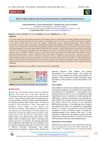 16 citations,
July 2012 in “Current pharmaceutical biotechnology”
16 citations,
July 2012 in “Current pharmaceutical biotechnology” New treatments for skin conditions related to the sebaceous gland are being developed based on current research.
 32 citations,
January 2022 in “International Journal of Molecular Sciences”
32 citations,
January 2022 in “International Journal of Molecular Sciences” Melatonin, a hormone, can help protect skin from aging by reducing stress, inflammation, and damage, and may also help treat hair loss in women.
 7 citations,
February 2019 in “International Journal of Dermatology”
7 citations,
February 2019 in “International Journal of Dermatology” Gray hair is caused by reduced melanin production or transfer issues, linked to aging and possibly health conditions, with treatments focusing on color camouflage.
 44 citations,
October 2019 in “International Journal of Molecular Sciences”
44 citations,
October 2019 in “International Journal of Molecular Sciences” Melatonin, usually known for sleep regulation, also has antioxidant properties that can protect skin, stimulate hair growth, and improve skin conditions, with topical application being more effective than oral use.
 400 citations,
January 2014 in “British Journal of Sports Medicine”
400 citations,
January 2014 in “British Journal of Sports Medicine” The consensus provided guidelines for treating the Female Athlete Triad and a system to decide when athletes can return to sports.
 3 citations,
January 2021 in “Wear”
3 citations,
January 2021 in “Wear” Hair's resistance to wear varies by ethnicity and treatment, with less wear indicating stronger hair.
1 citations,
December 2022 in “Pharmaceutics” Finasteride-loaded microemulsions can effectively enhance skin delivery for treating hair loss.
 16 citations,
January 2011 in “Indian Journal of Dermatology, Venereology and Leprology”
16 citations,
January 2011 in “Indian Journal of Dermatology, Venereology and Leprology” Indian dermatosurgical practitioners were given guidelines in 2011 to reduce infection risks, including hand hygiene, sterilization methods, operation theater standards, and proper waste disposal.
 15 citations,
May 2011 in “Veterinary Dermatology”
15 citations,
May 2011 in “Veterinary Dermatology” Vitamin A might be a safe extra treatment for dogs with sebaceous adenitis, but more research is needed to prove its effectiveness.
 December 2015 in “Biomedical and biopharmaceutical research”
December 2015 in “Biomedical and biopharmaceutical research” Argan oil makes hair care products spread better and improves their texture.
115 citations,
August 2004 in “The journal of investigative dermatology/Journal of investigative dermatology” Modulating Cytochrome P450 activity could help develop new skin disease treatments.

Proper care and diet are crucial to prevent health issues in gerbils.
 May 2024 in “International Journal of Nanomedicine”
May 2024 in “International Journal of Nanomedicine” Biodegradable polymers can improve cannabinoid delivery but need more clinical trials.
1 citations,
May 2017 in “InTech eBooks” The chapter explains common scalp conditions, including infections, infestations, and tumors.
 22 citations,
August 2019 in “Environmental research”
22 citations,
August 2019 in “Environmental research” Pseudomonas sp. T5-6-I bacteria increase selenium uptake in Brassica oleracea plants by 130%.

Afro-textured hair is more fragile and prone to certain scalp conditions, requiring careful treatment and more research for effective management.
 1 citations,
January 2015 in “Journal of Pigmentary Disorders”
1 citations,
January 2015 in “Journal of Pigmentary Disorders” Treating melasma in men is difficult, especially for the deeper skin layers, and may need more than just topical treatments.
 July 2023 in “International journal of current research in chemistry and pharmaceutical sciences”
July 2023 in “International journal of current research in chemistry and pharmaceutical sciences” The shampoo made with Bhringraj leaf and other natural ingredients shows promise as a natural dandruff solution.
 June 2024 in “Molecules/Molecules online/Molecules annual”
June 2024 in “Molecules/Molecules online/Molecules annual” Platycladus orientalis flavonoids protect balding hair from UV damage and slow hair color change.
 2 citations,
January 2019 in “Applied clinical research, clinical trials and regulatory affairs”
2 citations,
January 2019 in “Applied clinical research, clinical trials and regulatory affairs” Different countries have regulations to ensure the safety of hair care products, with some recalling hair straighteners due to high formaldehyde.
 3 citations,
October 2020 in “Dermatology Reports”
3 citations,
October 2020 in “Dermatology Reports” Many women in North West Saudi Arabia use herbal and home remedies for hair care, often learning about them through family and media.
 November 2023 in “International Research Journal of Modernization in Engineering Technology and Science”
November 2023 in “International Research Journal of Modernization in Engineering Technology and Science” Herbal shampoos clean and improve hair naturally without harmful side effects.
 October 2024 in “Journal of Advanced Pharmaceutical Technology amp Research”
October 2024 in “Journal of Advanced Pharmaceutical Technology amp Research” Trigonelline nanocrystal cream effectively promotes hair growth and may reduce side effects.
 November 2022 in “International journal of pharmaceutical sciences review and research”
November 2022 in “International journal of pharmaceutical sciences review and research” Adding value and variety to herbal products helps promote them and can make India a leading exporter.
November 2023 in “Cosmetics” Rice derivatives in conditioners protect and improve hair health.
 1 citations,
August 2017 in “Semiotica”
1 citations,
August 2017 in “Semiotica” The paper concludes that breast cancer treatment involves complex interactions between medical symptoms, patient experiences, and commercial influences, requiring a holistic approach.
3 citations,
January 2023 in “Agronomy” KDML105 bran extract may help with hair growth and prevent hair loss.
 5 citations,
November 2007 in “British journal of nursing”
5 citations,
November 2007 in “British journal of nursing” Nurses should treat emollients as medications, understanding their use and effects for treating skin conditions.
 7 citations,
January 2007 in “Elsevier eBooks”
7 citations,
January 2007 in “Elsevier eBooks” Shampoos clean hair mainly with surfactants and have added ingredients for extra benefits.
 January 2017 in “Springer eBooks”
January 2017 in “Springer eBooks” The document explains various skin conditions and their treatments.
























